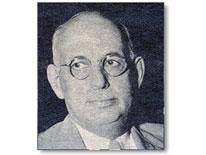
Major and Superintendent (October 1932-November 1941)
Ernest W. Brown was born in 1873, in New York City and educated in New York City Public Schools. He attended the Business College of New York before moving to Washington, DC to work as a clerk at the United States Department of Agriculture.
In 1896 he joined the Metropolitan Police Department as a private, and began his work as a patrolman in Georgetown along the wharves and the canal. He then rose through the ranks earning a solid reputation and by 1925 he was promoted to Inspector of the newly created Traffic Division. He remained there as an Assistant Superintendent until being selected by the Board of Police Commissioners to take over as Major and Superintendent.
Superintendent Brown became the Department’s fifteenth Major and Superintendent, and only the third to rise to the position from the rank of private.
Superintendent Brown instituted a number of changes and worked during some challenging times. He created the Metropolitan Police Boys clubs to deal with male juvenile delinquency. He bolstered the Traffic Division and was the first Superintendent to put “Scout Cars” into service in the Precincts. One of the first news quotes he gave as a new Chief was that he promised a “sane police administration,” an obvious rebuke to his predecessors.
Superintendent Brown’s administration was not without controversy as the department and the city was accused of failing to close over 90% of serious cases. Following that report, there was a crime commission created (one of many to come) to study the problem of crime in Washington, D.C. Despite these negatives, his agency achieved a good deal of success in combating gambling, and in solving some high profile murder cases.
His tenure as chief saw him through three of President Franklin D. Roosevelt’s Inaugurations, and to the brink of the Second World War. Superintendent Brown retired and was honored by having Camp Brown named after him.
